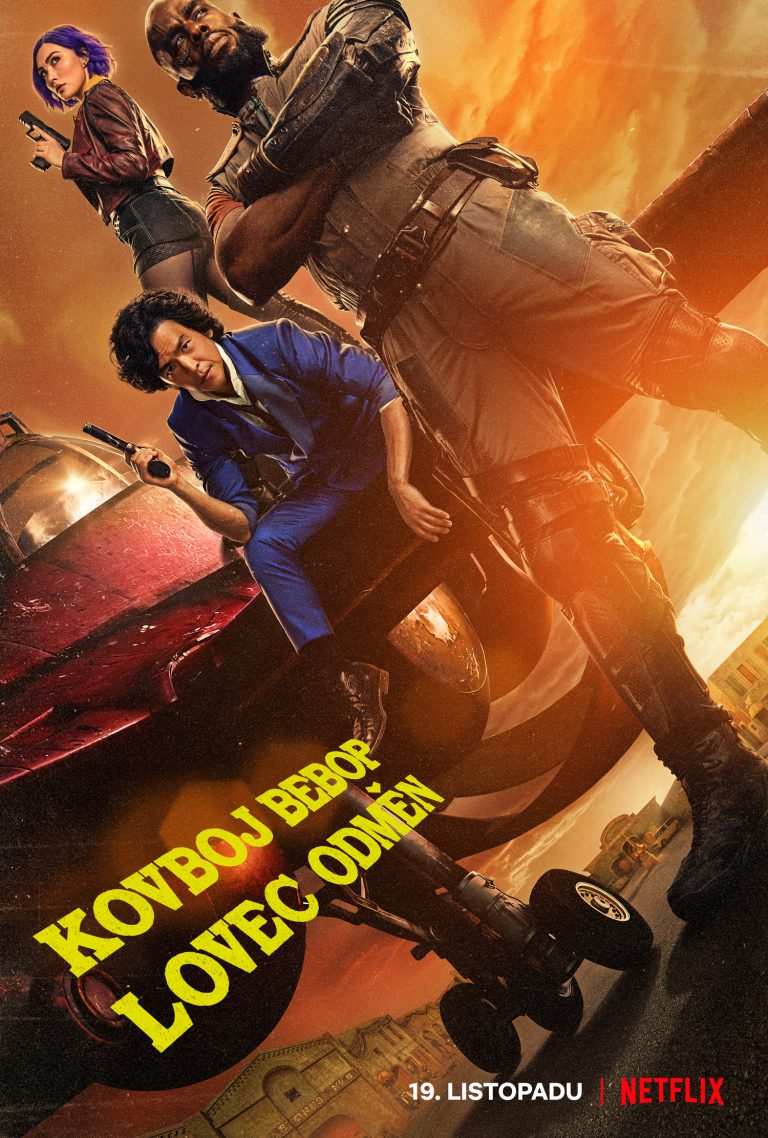
Synopsis :COWBOY BEBOP is an action-packed space Western about three bounty hunters, aka “cowboys,” all trying to outrun the past. As different as they are deadly, Spike Spiegel (John Cho), Jet Black (Mustafa Shakir), and Faye Valentine (Daniella Pineda) form a scrappy, snarky crew ready to hunt down the solar system’s most dangerous criminals — for the right price. But they can only kick and quip their way out of so many scuffles before their pasts finally catch up with them.
Based on the beloved anime series, COWBOY BEBOP is executive produced by André Nemec, Jeff Pinkner, Josh Appelbaum and Scott Rosenberg of Midnight Radio, Marty Adelstein and Becky Clements of Tomorrow Studios, Makoto Asanuma, Shin Sasaki and Masayuki Ozaki of Sunrise Inc., Tim Coddington, Tetsu Fujimura, Michael Katleman, Matthew Weinberg, and Christopher Yost. Nemec serves as showrunner. Original anime series director Shinichirō Watanabe is a consultant on the series, and original composer Yoko Kanno returns for the live-action adaptation. The series also stars Alex Hassell and Elena Satine.
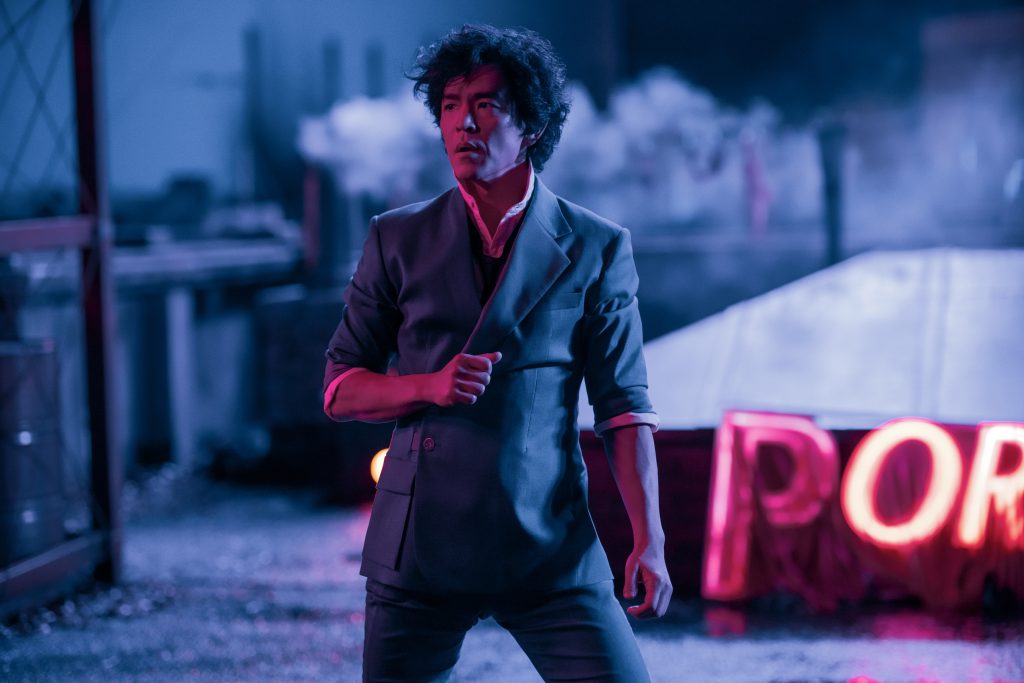
Q&A with Actor John Cho and a Musician/DJ Steve Aoki
JC: What was your relationship with Cowboy Bebop? How did you find it?
SA: I’ve always been into anime culture from growing up. It’s an iconic, classic anime. When I heard about you getting involved, [I thought] that was really cool, “Okay, this is live-action, [it] needs to happen.” And then I got to remix the iconic track, “Tank,” which is attached to the IP.
JC: I can’t think of a better opening for a TV show. It’s a really great piece of music.
SA: Yeah. Absolutely.
JC: It’s also — as I think about it — I feel like when I was growing up, Asian pop culture wasn’t cool, and to be here in this moment, this larger moment…
SA: It’s interesting you say that, because I used to go to Anime Club when I was in college, in the ‘90s. And it was a total nerd-fest — me with a bunch of other geeks. And it wasn’t cool at all. But we were so obsessed with anime. And now it’s like, everywhere. You open up Netflix, it’s probably one of the most watched categories.
JC: The other thing I always thought was interesting about Asian films was that in their culture — in China, Japan and Korea at least — adults read manga, right? That to me has always struck me as storyboarding for the films. It’s in the culture, then they go — because it’s not considered for kids only. It elevates the art form.
SA: In Japan, it’s everywhere you go, you have a character that depicts something you’re supposed to do. Like walking across the street, [there’s] a cute little anime [character] going, “Okay, you can walk now” or “Stop now.” It’s part of normal life.
Here in America, I always wanted to see more of that, and now it’s happening. Now you see it, like it’s constant conversation, you hear about it all the time, wherever you go.
JC: Have you ever heard of WebToons?
SA: I love WebToons.
JC: I haven’t seen them — I don’t get them on my phone or anything. I understand on my last trip to Korea that this is a popular form of entertainment. So how does it work? They send panels…
SA: Yeah, it’s like a vertical scroll, that’s [how] you see it, you go up…
JC: It’s daily, right?
SA: Yeah, it’s daily, and there’s tons of content. I think the great thing about WebToons is that there’s a lot of these new indie artists that are able to showcase their stories, their online books.
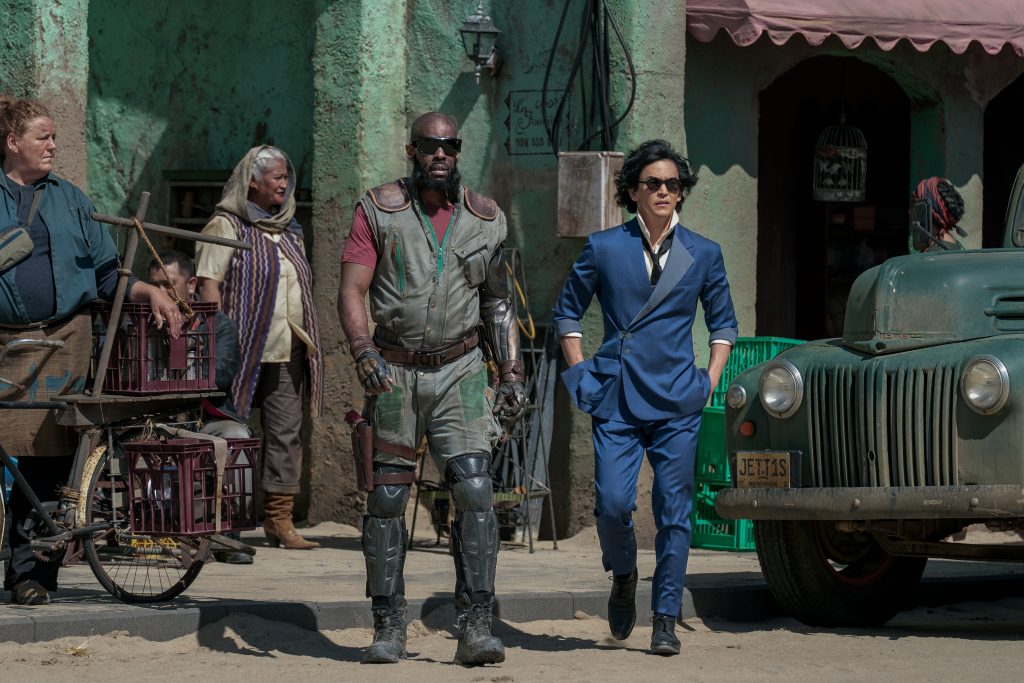
JC: There’s a low barrier to entry so [one] doesn’t have to depend on gatekeepers to get in and do your thing. [It’s] most democratic that way.
SA: Right.
JC: Can you discuss the conception of the Cowboy Bebop-Tank remix and how you got involved?
SA: I’m not sure who talked to who on the Netflix side versus our side, but this was a big deal for me when it came to my table that I could remix Tank. I’m already an anime kid at heart. It’s always tough when you have so much pressure on something so iconic.
JC: I wouldn’t know what you’re talking about.
[both laugh]
SA: You’ve got the hair down to a T, so just the pressure of that, that’s a lot.
Yeah, but I was like, I want to make it groovy. I mean, the original is very jazzy, and electronic music is not jazz. It’s hard to take those time signatures and put them into something that’s very structured in electronic [music]. But I wanted to make it groovy, I wanted to make people dance. This is something that you could play at a show, or at a club, but you’d definitely play just watching, sitting in your home or whatever.
JC: You’re right. I hadn’t thought about it. The original is aggressive, right? It’s propulsive. And yours is like — it has all these spaces, actually. It goes [gestures up and down].
SA: Yeah, right. Right. It’s cool.
JC: Have you met Yôko Kanno?
SA: No, I haven’t. I was hoping to meet her. She’s a legend, and I think it’s really cool that she’s a female in this space, doing something like in jazz and all these art forms. You always hear the legends, like Miles Davis, and John Coltrane, legends in space. But a female jazz composer is incredible to hear about. Her especially.
JC: When I learned about the show and then when I was off the show, one of my first questions was “Is Yôko Kanno in?” I don’t think it’s wise to go forward without her. I felt like the treatment of the music completely changes the meaning of the scenes, because she has such power over what the show means, from scene to scene. She makes choices that other music supervisors would never make. She’s going against the grain a lot of the time. You think the scene is about A, but her music makes you think, “Oh, it’s about B.”
What does “Cowboy Bebop” mean to you as a Japanese-American?
SA: I love that. I love when Japanese culture is being heralded and showcased. And we can go back to classics like this, and then revisit and bring it back to this new life. Any time any sort of Japanese culture comes out, it’s really exciting.
JC: It’s really cool for an Asian composer to take Western genres, “let me take that, do my thing.” It’s its own thing.
SA: And it is different. It’s like its own lane. Of course it’s jazz, and it’s rich, and it’s got so many dynamic elements. But you can’t make that unless you’re in a completely different environment and head space.
JC: You can’t do it without mastery of it. She just owns all these genres, and it’s really fascinating.
What are you most excited to see in the live-action series, aside from [yours truly]?
[they laugh]
SA: I’m rooting for you, John, I’m here for you.
JC: That was the correct answer!
[they laugh]
SA: Of course Spike is my favorite.
JC: Well, I hope I don’t disappoint you. We’ll see afterwards.
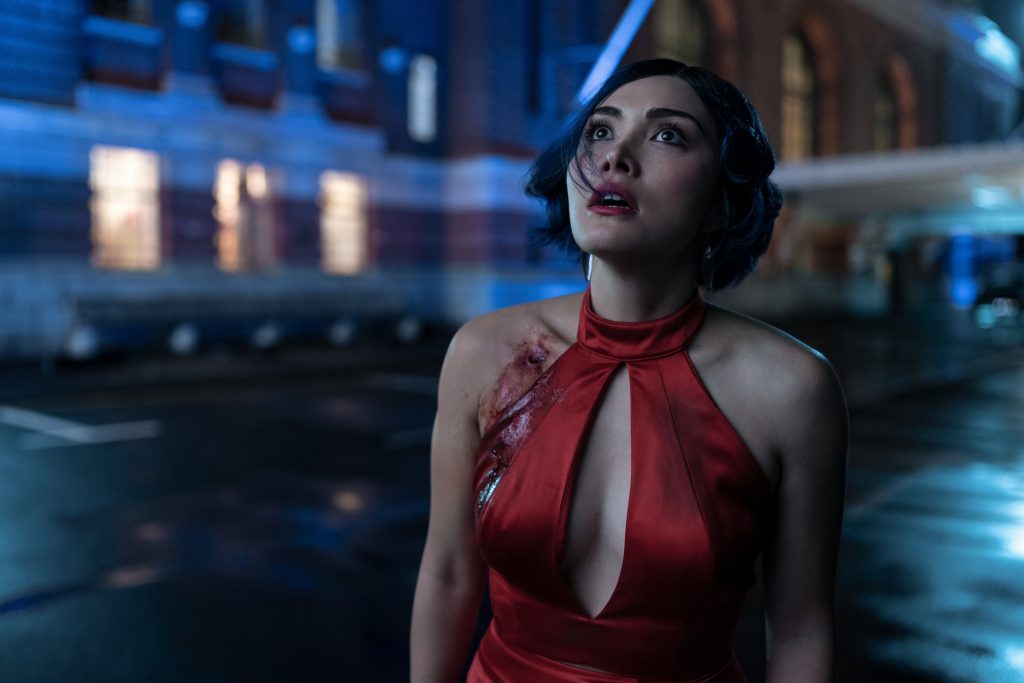
JC : Now I’m going to go to some press questions.
Q : Given the huge significance of the original music played to provide Cowboy Bebop so much crossover appeal internationally, what was your thought process in approaching this project?
SA: Well, electronic music, just by the pure basis of it, is like the fourth language. It’s the language that breaks the fourth wall. It goes globally: everyone can connect to it. In that regard, as long as you get that feeling and it emotionally tugs you [as] it’s supposed to do — if that’s what it’s doing to you, then it’s doing its job. I think everyone can relate to this. It doesn’t matter where you are, what walk of life you are, what language you speak. So I hope everyone likes it.
JC: Okay.
JC : Since jazz encourages improvisation, do you see a connection between that and the notion of a remix?
SA: Yeah. Remixing is — you are essentially improvising on the spot. I’m taking all those — the Midi, the melody, the bass that you’re hearing, and improvising on top of what samples I’m deciding to choose. I took the iconic hits that are heard on actual tracks, I wanted those to resonate.
But then I wanted to be like, well, “I’ve got to Aoki-fy this thing. I’ve got to make it dancey, I’ve got to make it fun.” And then meld that with vocal samples, with less jam. You’ve got to put less jam in there. It’s a bit more difficult on the spot, but there is an improvised element, of course, in the actual production of the track.
JC: That is also so much like the process of us making the show. I guess talking in musical terms, you want people to recognize the melody — that’s the song — but also do your own thing and stretch it as much as you can and put your own spin into it.
SA: Right, right. Absolutely.
JC: It’s comforting that you had the same thing going on.
Q : What memories does a series like Cowboy Bebop invoke in you?
SA: It’s just that little kid in me, being excited to see [it]. I remember when I first saw the film, “Ghosts in the Shell,” and all the Studio Ghibli stuff, and the Toy Animation stuff. I followed them. It’s like when you like one IP or one project or one storyline, you just want to follow the maker.
It never goes away, you know? It’s like what you were saying about in Asia, it doesn’t matter if you’re 10, 20, or 40 or 50 or 60. People are still reading it as part of their culture. I see that happening more and more now. It doesn’t matter what age.
JC: Does it take you back to your youth, too, because, like some of the technology in the show, it is of its time? The show is set in the future but it was made at a particular moment, so there’s like VCRs and stuff like that.
SA: Yeah. I’m a collector, too, so I have some of the Dragon Ball cels. I like to collect some of the things I remembered seeing when I was younger. Like, “Oh, this is the one scene right here and it’s painted in the back” and stuff like that. Nostalgia actually was a big deal during Covid. Just going back in time because I had time on my hands. So going back to all those things I used to love when I was a kid. And now that I’m older, I have time…
JC: How long did you take off from live shows because of Covid?
SA: Definitely a year –— plus five months. What about you?
JC: We were shooting the show in New Zealand, which happened to not have Covid. Because they closed their borders. So that was really a relief for us. Just on a personal level, like not having to fear it.
That’s nuts, having that cut out of your life.
SA: Yeah. But you know what? I realized how adaptable I am as a human being. I actually really, really enjoyed it. I toured for 15 years, like 200 to 300 shows a year. And it never stops. Some bands do an album, then they tour off the album, and then they take a break.
JC: You’re doing it Bob Dylan style. He never could get off the road.
SA: Yeah.
JC: Wow. That’s nuts.
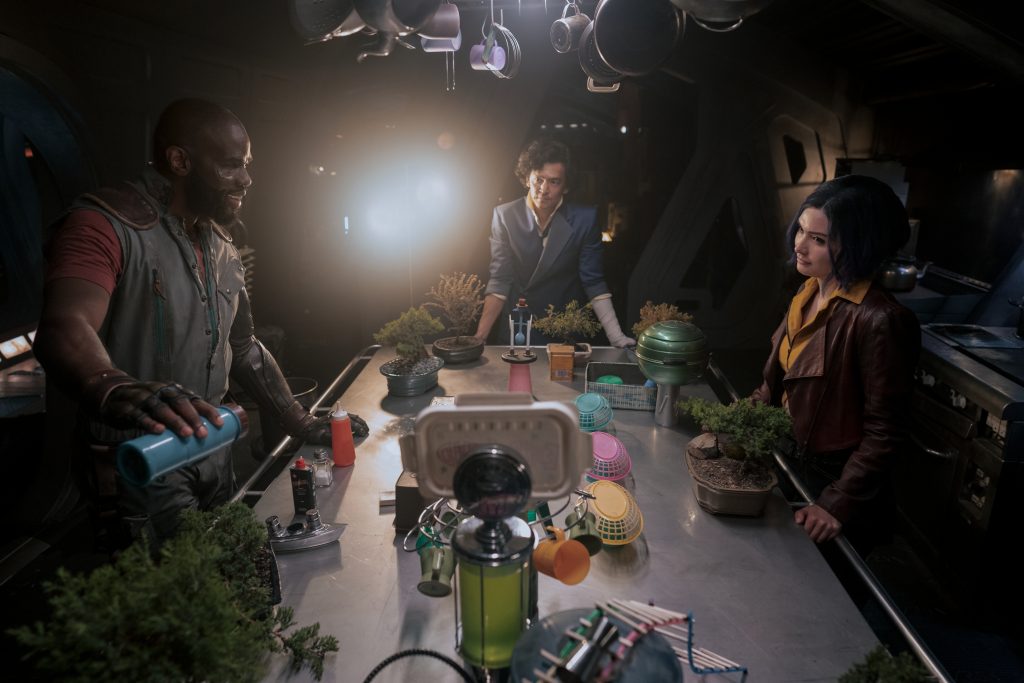
Q : “There’s a chance in remixing Tank, which originally incorporates Latin elements in its composition. How did you balance adding in your signature EDM sound as well as paying respect to your Japanese American roots?
SA: My sound is definitely global. I [incorporate] a lot of Latin elements into my music already. People don’t even realize how many Latin elements are actually in other tracks that you wouldn’t think of as Latin. It’s like that everywhere I go. Lucky for me, I travel the world, so I’m constantly influenced and informed by all the sounds that I hear. It could be anywhere. A taxicab in South Africa, I could be hearing music that the taxi driver’s playing and I’m taking my notes: “Who’s this? Where is this from?” I try to book studio time wherever I am, whether I’m in Europe or Morocco or Australia.
JC: You mean you try to book studio time when you’re traveling because you’re like, “I’m absorbing something, I want to see how it comes out”?
SA: Yeah. And also, I want to book studio time to meet up with artists in those regions. So that way, when they come in — and a lot of the time they bring in their arsenal — I have to have my arsenal, my hard drive of stuff, and I’m like, “I want to hear your signature, your sound, your rhythms.”
[For example], being in the Middle East, there are different rhythms, there are different time signatures and I’m like, “Wow, this is so different from what I would think of.” To get in the studio, to mesh minds with the best of that region, is always exciting stuff.
JC: Wow. Dude, you may be the most self-actualized person I’ve ever met.
SA: Well, look at you. I think about what you have to do. You have to change roles constantly, and then you’re at peak performance of what you do. Which is why you’re John Cho. You’re John Cho for a reason because every time you take on a role, you own the role. You become that, [so] everyone goes, “Okay, he’s this person, everyone thinks he’s this person,” then, boom, you switch it up. You constantly switch it up, And that’s extraordinary.
JC: Thanks, man.
SA: A lot of people get stuck in a certain role, right? Especially Asians. I was listening to an interesting conversation. When the power [is] seeing “Well, you’re this look to the world, so you have to represent what people expect of you.” But you keep breaking the mold and doing different things.
JC: Well thanks, man. I always thought that people were like, “Were you afraid of being stereotyped in comedy if you do ‘Harold and Kumar’ or something. I was like, “Well, I’m Asian. I’m familiar with that. I’ll take on that stereotype.” So you learn to resist and move on.
Q : There’s a chance that this remix will be someone’s first introduction to Tank and Cowboy Bebop. How does that make you feel?
SA: That’s actually very cool. You don’t think about it, because we know about the original, we know about the original song and how important it is to Cowboy Bebop as a brand. I never thought about it like that. There’s these young kids that weren’t familiar with, didn’t grow up with that. So — Wow! That’s actually pretty cool.
JC: I’m also thinking the same thing. That’s really cool. Because it’s special. It’s a special experience.
Q: As an Asian-American who has had a successful career in entertainment, how do you feel the industry has changed from when you were first starting out to now?
SA: Unfortunately, for DJs, there’s not that many known Asian DJs. I mean, they’re coming out of the woodwork, but it’s few too far between to find other prominent Asian DJs. Even Asian worldwide musicians.
JC: Really?
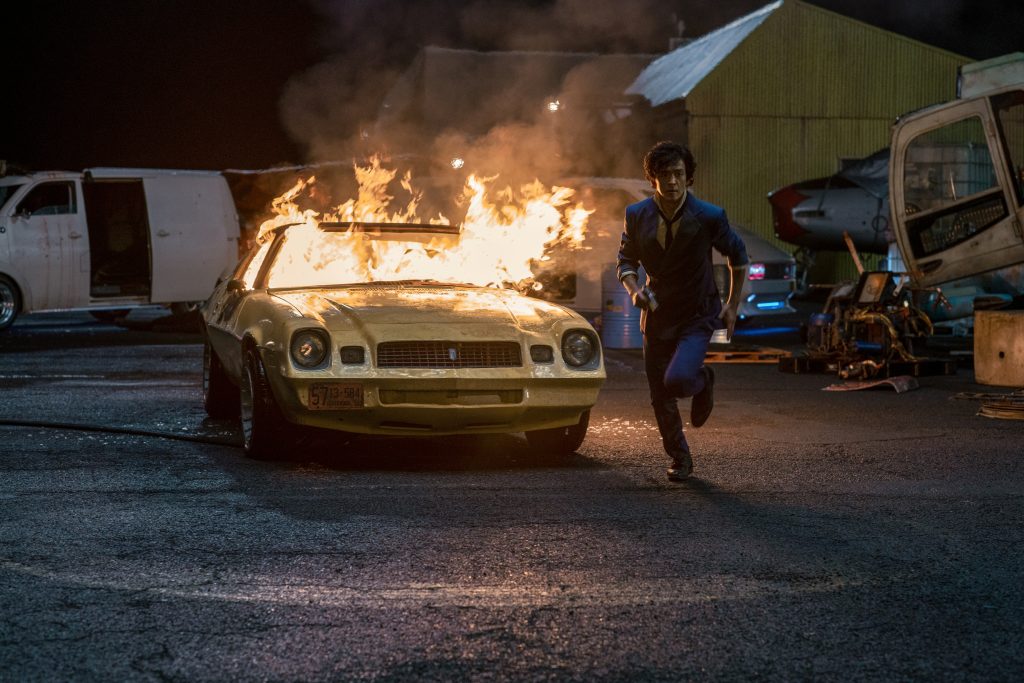
SA: Yeah, if you really think about it. Of course, you have the K-Pop world that’s just bursting at the seams, with BTS — everyone knows BTS. But if you think about Asian-American musicians and artists, there’s not that many that are well known. Like Mike Shinoda, I always looked up to him because Linkin Park is one of my favorite bands of all time. He was a front man and was the writer, and was a musician, he did everything in the group.
And I love Chad Hugo from the Neptunes. They actually inspired me to become a producer. He’s the Filipino dude right next to one of the coolest guys on the planet, Pharrell [Williams], making music for them.
I’d love to see more Asian representation in music, period. I always tell kids that come up to me that are aspiring musicians, “Just keep making them hits.” Keep putting it out there. There’s enough platforms to be heard.
JC: That surprises me, with the availability of technology, what you can do at home on a computer nowadays, and what you can do solo or with other people. Collaboration is so much easier than it used to be before the computer, right?
SA: Yeah, exactly. Oh, yeah. I do more collaborations not in-person than I do in person. It’s a lot of sending files back and forth.
JC: So you work on it, and then you send it back, back and forth…
SA: Right. I can deliver an entire song — the vocals, melody, actual record and they just sing it and send it right back. So as much as I love in-person, and I used to do writing caps in my studio — obviously Covid really limited that. But as you get used to sending files back and forth, it doesn’t seem so foreign anymore to do that.
JC: Well, from my perspective on the film and TV side, it’s been very cool to see it blossom. And the other thing that’s been really cool is how, growing up Asian-American, I always felt like “We’re not American, according to…“ and, “We’re not Asian, according to…“ so we’re always in the middle.
What’s cool is all the Asian entertainment that’s come over here and how the rising tide has lifted all boats.
SA: Yes, exactly.
JC: So this collective idea — and the idea that there was “the one” has gone away. Who’s the one that’s going to [raise up], who’s the one star, the one show, the one movie that’s going to break the [barriers]? All of us. So that feels like the kind of philosophy in the air, and I love it.
I’m making an effort, too, on a personal level. I don’t think I know enough Asian-American writers, directors, actors — and I shouldn’t wait for that to happen. I’ve got to be active in doing that, and making connections, and we’ll see what happens.
[the following can be cut]
All right, that feels like a good place to end. That’s all the time we have. It was really great chatting with you, man.
SA: Yeah. And my remix drops at 9 pm today on my YouTube channel.
Here’s the trailer of the film.

